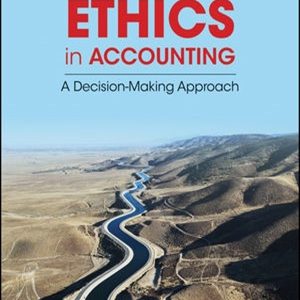This is completed downloadable of Ethics in Accounting A Decision-Making Approach 1st Edition Test Bank Klein

Product Details:
- ISBN-10 : 9781118928332
- ISBN-13 : 978-1118928332
- Author: Gordon Klein
This book provides a comprehensive, authoritative, and thought-provoking examination of the ethical issues encountered by accountants working in the industry, public practice, nonprofit service, and government. Gordon Klein’s, Ethics in Accounting: A Decision-Making Approach, helps students understand all topics commonly prescribed by state Boards of Accountancy regarding ethics literacy. Ethics in Accounting can be utilized in either a one-term or two-term course in Accounting Ethics.
A contemporary focus immerses readers in real world ethical questions with recent trending topics such as celebrity privacy, basketball point-shaving, auditor inside trading, and online dating. Woven into chapters are tax-related issues that address fraud, cheating, confidentiality, contingent fees and auditor independence. Duties arising in more commonplace roles as internal auditors, external auditors, and tax practitioners are, of course, examined as well.
Table of Content:
- Chapter 1 Introduction to Ethics
- AM I ETHICAL?
- WHAT IS ETHICS?
- ETHICS AND ACCOUNTING
- ETHICS IN OUR DAILY LIVES
- ETHICS IN OUR PROFESSIONAL ENDEAVORS
- The AICPA Code of Professional Conduct
- The IFAC Code of Ethics for Professional Accountants
- ETHICAL JUDGMENTS IN ACCOUNTING
- Ethics in Financial Accounting
- Ethics in Tax Reporting
- Ethics in Internal Controls
- Ethics in Management Accounting
- Ethics in Governmental and Nonprofit Accounting
- Ethics in Other Accounting Roles
- COMMON ETHICAL RATIONALIZATIONS
- “Everyone Does It”
- “The Other Guy’s Worse”
- “If It’s Not Illegal, It Can’t Be Wrong”
- “No Harm, No Foul”
- “They Made Me Do It”
- ETHICS IN THIS BOOK
- WHY SHOULD I BE ETHICAL?
- SOLUTION TO “AM I ETHICAL?”
- EXERCISES
- Ethics in Everyday Life
- The Regulatory Environment
- General Ethics Issues
- Common Ethical Rationalizations
- Chapter 2 Ethical Principles and Reasoning
- AM I ETHICAL?
- DISTINGUISHING ETHICAL BEHAVIOR FROM LEGAL BEHAVIOR
- THE UNIVERSALITY OF ETHICAL RULES
- Ethical Absolutism
- Ethical Relativism
- Ethical Absolutism versus Relativism
- AN INTRODUCTION TO THE AICPA CODE
- An Overview
- The Core Principles of Professional Conduct
- THE DEVELOPMENT OF MORAL REASONING
- Kohlberg’s Stages of Moral Development
- MAKING ETHICAL DECISIONS
- Rest’s Four-Component Model of Ethical Decision Making
- The Accounting Profession’s Models of Ethical Decision Making
- Is Ethical Decision Making Truly Rational?
- SOLUTION TO “AM I ETHICAL?”
- EXERCISES
- Legality versus Ethicality
- Ethical Absolutism and Relativism
- Principles of Accounting Ethics
- Applying Ethics to Accounting Problems
- Kohlberg’s Stages of Moral Development
- Comprehensive Problems
- Chapter 3 The Core Philosophies
- AM I ETHICAL?
- THE CORE PHILOSOPHIES
- Consequentialism
- The Nature of Utilitarianism
- Criticisms of Utilitarianism
- Deontology
- REVISITING CORE ETHICAL PRINCIPLES
- Is Lying Ever Ethical?
- Is Stealing Ever Ethical?
- Is Discrimination Ever Acceptable?
- NEUROBIOLOGY AND ETHICAL DECISIONS
- A Self-Test
- The Neuroscience of Deontology and Consequentialism
- SOLUTION TO “AM I ETHICAL?”
- EXERCISES
- Core Principles
- Lying, Stealing, and Cheating
- Business Applications
- The “Trolley” Problems
- Comprehensive Problems
- Chapter 4 Virtue, Justice, and Social Responsibility
- AM I ETHICAL?
- DISTRIBUTIVE JUSTICE
- The Nature of Justice
- Theories of Distributive Justice
- The Neurobiology of Distributive Justice
- VIRTUE ETHICS
- EGOISM AND CONCERN FOR OTHERS
- The Nature of Egoism
- Proponents of Egoism
- Critics of Egoism
- CORPORATE SOCIAL RESPONSIBILITY
- The Nature of Corporate Rights and Duties
- Sustainability and Corporate Social Responsibility
- SOLUTION TO “AM I ETHICAL?”
- EXERCISES
- Issues of Distributive Justice
- Virtue Ethics
- Social Responsibility
- Social Responsibility and Religion
- Comprehensive Problems
- Chapter 5 Why We Cheat
- AM I ETHICAL?
- CHEATING
- THE RATIONAL MODEL OF CHEATING
- The Becker Rational Model
- Flaws in the Becker Rational Model
- A PSYCHOLOGICAL MODEL OF CHEATING
- The Importance of Self-Image
- The Influence of Self-Image on Cheating
- Implications of the Self-Image Maintenance Trade-Off
- HOW THE INTENSITY OF A MORAL ISSUE AFFECTS BEHAVIOR
- The Magnitude of Consequences
- Social Consensus
- Probability of Effect
- Temporal Immediacy
- Proximity
- Concentration of Effect
- OTHER INFLUENCES ON ETHICAL BEHAVIOR
- Gender Differences
- The Overconfidence Bias
- Lessened Adherence to Social Norms
- Cultural Differences
- Cheating in the Animal Kingdom
- SOLVING THE CHEATING PROBLEM
- SOLUTON TO “AM I ETHICAL?”
- EXERCISES
- The Becker Rational Model of Cheating
- The Consequences of Cheating
- Cheating versus Fair Competition
- The Psychology of Cheating
- Rationalization and Self-Image
- Moral Intensity
- Comprehensive Problems
- Chapter 6 Greed, Corruption, and Collusion
- AM I ETHICAL?
- THE INSTINCTIVE URGE OF GREED
- The Nature of Greed
- The Biological Origins of Greed
- BRIBERY
- The Nature of Bribery
- Identifying Bribes
- Maintaining Accurate Accounting Records
- Bribery and the Accounting Profession
- Detecting Bribes
- Whistleblower Protections
- KICKBACKS, COLLUSION, AND RELATED ARRANGEMENTS
- Commissions
- Referral Fees
- Contingent Fees
- Gifts and Entertainment
- INSIDER TRADING
- The Ethics of Insider Trading
- The Legal Issues
- SOLUTION TO “AM I ETHICAL?”
- EXERCISES
- Bribery
- Referral Fees and Kickbacks
- Gifts
- Contingent Fees
- Insider Trading
- Comprehensive Problems
- Chapter 7 Fraud and Earnings Management
- AM I ETHICAL?
- FINANCIAL FRAUD
- The Fraud Triangle
- The Enron Scandal
- Common Fraud Techniques
- COSO and Fraud
- TAX FRAUD
- The Rational Model of Tax Cheating
- Flaws in the Rational Model of Tax Cheating
- Psychological Factors That Influence Taxpayer Honesty
- Manipulating Income Tax Reporting
- Detecting Tax Fraud
- SOLUTION TO “AM I ETHICAL?”
- EXERCISES
- General Principles
- Fraud Techniques
- Tax Fraud
- Comprehensive Problems
- Chapter 8 Discreditable Acts: Discrimination, Deceit, and Disclosure
- AM I ETHICAL?
- DISCREDITABLE ACTS UNDER THE CODE OF CONDUCT
- Specific Acts That Are Discreditable
- The Discreditable to the Profession Standard
- The Duty to Report Others’ Misconduct
- DISCREDITABLE ACTS IN TAX PRACTICE
- THE DUTY TO POSSESS SOUND MORAL CHARACTER
- The Nature of Moral Character
- THE ETHICS OF FULL DISCLOSURE
- The Duty to Present Material Facts
- The Duty to Not Obscure Important Information
- The Duty to Place Facts in Context
- The Duty to Apply GAAP
- The Duty to Disregard GAAP Rules
- Duties Concerning Nonfactual Presentations
- SOLUTION TO “AM I ETHICAL?”
- EXERCISES
- General Principles
- Discrimination
- Disclosures of CPA Exam Questions
- Record Retention
- Moral Character
- Accounting Disclosures
- Reporting Based on “Nonfacts”
- Comprehensive Problems
- Chapter 9 Confidentiality
- AM I ETHICAL?
- WHY CONFIDENTIAL INFORMATION IS PROTECTED
- WHEN INFORMATION IS CONFIDENTIAL
- The General Nature of Confidential Information
- Specific Issues Concerning Confidentiality
- WHEN DISCLOSURE OCCURS
- Internal Disclosures
- External Disclosures
- CLIENT CONSENT
- The Nature of Specific Consent
- Situations in Which Disclosure Is Required Without Client Consent
- Situations in Which Disclosure Is Permitted Without Client Consent
- IDENTIFYING WHO IS A CLIENT
- Current Clients
- Prospective and Past Clients
- THE ACCOUNTANT–CLIENT PRIVILEGE
- States That Treat Client Communications as Privileged
- Federal Rules That Treat Client Communications as Privileged
- CONFIDENTIALITY IN TAX PRACTICE
- Taxpayer Self-Disclosure
- Preparer Disclosure of Client Tax Information
- IRS Disclosure of Taxpayer Information
- SOLUTION TO “AM I ETHICAL?”
- EXERCISES
- Identifying Confidential Information
- Required Disclosures
- Accountant–Client Privilege
- Tax Return Disclosure
- Comprehensive Problems
- Chapter 10 Independence and Moral Seduction
- AM I ETHICAL?
- WHEN INDEPENDENCE IS REQUIRED
- HOW THE INDEPENDENCE RULE IS SATISFIED
- What Conduct Achieves Independence?
- Who Must Be Independent?
- During What Time Period Is Independence Required?
- THE SEVEN THREATS TO INDEPENDENCE
- The Familiarity Threat
- The Adverse Interest Threat
- The Advocacy Threat
- The Undue Influence Threat
- The Self-Review Threat
- The Management Participation Threat
- The Self-Interest Threat
- MORAL SEDUCTION AND OTHER BEHAVIORAL BIASES
- Self-Serving Bias
- Confirmation Bias
- The Cooperation Preference
- The Desire to Please
- Discounting
- Moral Seduction
- SAFEGUARDS THAT COUNTERBALANCE THREATS TO INDEPENDENCE
- Safeguards Created by Regulatory and Legislative Bodies
- Safeguards Created by Attest Clients
- Safeguards Created by Auditors
- REQUIRED ACTIONS WHEN INDEPENDENCE IS IMPAIRED
- THE IMPACT OF THE INDEPENDENCE RULE ON OTHER ENDEAVORS
- Independence in Tax Practice
- Independence in Consulting and Outsourced Internal Audit Services
- Independence in Trust and Estate Administration
- OTHER SOURCES OF INDEPENDENCE RULES
- SOLUTION TO “AM I ETHICAL?”
- EXERCISES
- When Independence Is Required and Satisfied
- Covered Members
- The Familiarity Threat
- Adverse Interest and Advocacy Threat
- Adverse Interest Threat
- Undue Influence Threat
- Self-Review Threat
- Management Participation Threat
- Self-Interest Threat
- Behavioral Aspects of Auditing
- Comprehensive Problems
- Chapter 11 Conflicts of Interest
- AM I ETHICAL?
- IDENTIFYING CONFLICTS OF INTEREST
- CONFLICTS OF INTEREST IN THE ACCOUNTING PROFESSION
- THE BROAD PROHIBITION AGAINST CONFLICTS OF INTEREST
- Whose Interests Are Protected?
- When Does a Conflict Exist?
- What Is an Interest?
- CLIENT WAIVERS OF CONFLICTS OF INTEREST
- Actual Consent
- Implied Consent
- When Client Consent Is Not Permitted
- BEHAVIORAL ASPECTS OF CONFLICT OF INTEREST DISCLOSURES
- RESISTING TEMPTATION
- CONFLICTS OF INTEREST VERSUS THE DUTY OF CONFIDENTIALITY
- The Fund of Funds Case
- The Consolidata Services Case
- MANAGING CONFLICTS OF INTEREST
- CONFLICTS OF INTEREST IN TAX PRACTICE
- SOLUTION TO “AM I ETHICAL?”
- EXERCISES
- Identifying Conflicts of Interest
- Appearances of a Conflict
- Anticipated Adverse Client Interests
- Imputed Conflicts of Interest
- Conflicts of Interest in Management Accounting
- Conflict of Interest in Nonprofit Organizations
- Behavioral Issues Involving Conflict of Interest Disclosures
- Conflicts of Interest in Tax Practice
- Conflicts Involving Confidentiality Duties
- Comprehensive Problems
- Chapter 12 Duties as a Whistleblower
- AM I ETHICAL?
- WHAT IS WHISTLEBLOWING?
- THE TYPES OF WHISTLEBLOWERS
- Internal Whistleblowers
- External Whistleblowing
- WHISTLEBLOWER MOTIVATIONS
- Revenge
- Reputation Preservation
- Altruism
- Collecting Financial Rewards
- ADVERSITIES FACED BY WHISTLEBLOWERS
- The Downside of Whistleblowing
- Whistleblower Protections
- Employer Manipulation of the Antiretaliation Rules
- Employee Manipulation of the Antiretaliation Rules
- OUTSIDE AUDITORS AS WHISTLEBLOWERS
- Divulging Client Improprieties
- Divulging Audit Firm Improprieties
- WHISTLEBLOWING IN TAX PRACTICE
- The American View
- The International View
- CULTURAL ASPECTS OF WHISTLEBLOWING
- BIOLOGICAL ASPECTS OF WHISTLEBLOWING
- ENCOURAGING AN ETHICAL ORGANIZATIONAL CULTURE
- DECIDING WHETHER TO BECOME A WHISTLEBLOWER
- SOLUTION TO “AM I ETHICAL?”
- EXERCISES
- General Principles
- Statutory Incentives for Whistleblowers
- Internal Whistleblowing
- External Whistleblowing
- Retaliation
- Whistleblowing in Tax Practice
- Comprehensive Problems
- Chapter 13 Duties of Public-Company Auditors: The Sarbanes-Oxley Act
- AM I ETHICAL?
- HOW SOX AFFECTS PUBLICLY TRADED CORPORATIONS
- Audit Committees
- Establishing a Code of Conduct
- Establishing a Document Retention Policy
- HOW SOX AFFECTS COMPANY MANAGEMENT
- The Certification Requirement
- The Disallowance of Incentive-Based Compensation
- The Disallowance of Company-Provided Loans
- Prohibitions against Coercion
- Prohibitions against Whistleblower Retaliation
- THE IMPACT OF SOX ON AUDITORS
- PCAOB Regulatory Oversight
- Independence Rules
- Document Retention
- THE IMPACT OF SOX ON TAX PRACTITIONERS
- THE IMPACT OF SOX ON NONPROFIT AND PRIVATE ORGANIZATIONS
- SOLUTION TO “AM I ETHICAL?”
- EXERCISES
- The Audit Committee
- Duties of Managerial Employees
- Duties of Auditors
- SOX and Tax Practitioners
- Nonprofit Organizations and SOX
- Comprehensive Problems
- Chapter 14 Duties of Tax Professionals
- AM I ETHICAL?
- PROFESSIONAL RESPONSIBILITIES IN TAX PRACTICE
- The Governing Sources of Guidance
- The SSTS Framework
- DUTIES AS A TAX RETURN PREPARER
- Obtaining Client Information
- Filling in Information Gaps
- Formulating Tax Return Positions
- Evaluating Uncertain Tax Positions
- Completing a Tax Return
- Correcting Past Tax Returns
- Completing the Client Engagement
- DUTIES AS A TAXPAYER ADVOCATE
- DUTIES AS A TAX PLANNER
- GENERAL PROFESSIONAL DUTIES
- THE TAXPAYER’S DUTIES
- THE IMPORTANCE OF TRUTHFUL TAX REPORTING
- SOLUTION TO “AM I ETHICAL?”
- EXERCISES
- The Scope of Tax Standards
- Tax Return Preparer’s Duties
- The Use of Estimates
- Tax Reporting Standards
- Completing the Reporting Process
- Duties as a Tax Planner
- Taxpayer’s Duties
- Comprehensive Problems
- Chapter 15 Duties of Fiduciaries: Financial Planners, Trustees, and Executors
- AM I ETHICAL?
- FIDUCIARY RELATIONSHIPS
- The Nature of Fiduciary Relationships
- The Legal Consequences of Being a Fiduciary
- PERSONAL FINANCIAL PLANNERS AND ASSET MANAGERS
- Applicable Professional Standards
- Specific Duties Associated with Custody of Assets
- How to Avoid Creating a Fiduciary Relationship
- TRUSTS AND TRUSTEES
- The Structure of a Trust
- Advantages of Trusts
- Special Kinds of Trusts
- Accountants in Trust Practice
- The Specific Duties of a Trustee
- EXECUTORS AND ADMINISTRATORS
- The Structure of an Estate
- Accountants in Estate Practice
- FIDUCIARY ISSUES IN TAX PRACTICE
- Negotiating Tax Refunds
- Resolving Conflicts of Interest
- AUDITOR INDEPENDENCE REQUIREMENTS FOR TRUSTEES AND EXECUTORS
- The Ethical Dilemma
- The Independence Rules
- SOLUTION TO “AM I ETHICAL?”
- EXERCISES
- General Fiduciary Duties
- Trusts and Trustee Duties
- Wills and Executor Duties
- Executors and the Estate Tax
- Independence and Conflicts of Interest
- Conflicts of Interest
- Comprehensive Problems
- Subject Index
- EULA





